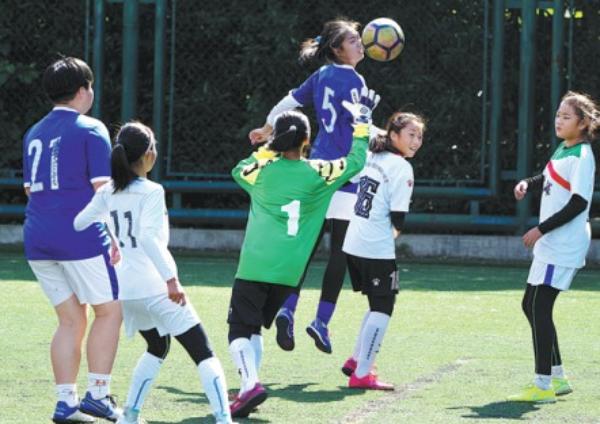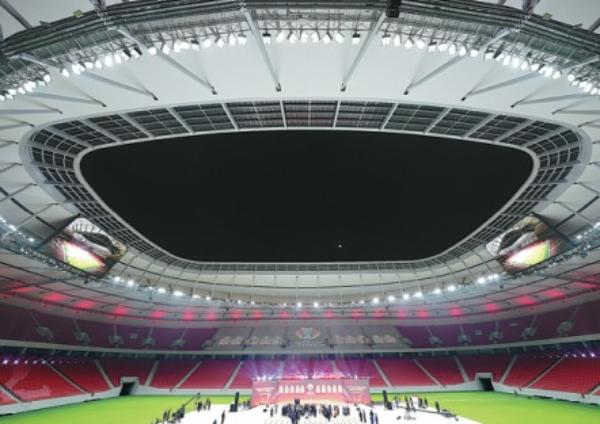 Local primary and middle school students train under the guidance of professional coaches at Shanghai Yangpu district's Baiyangdian Soccer Elite Base on Oct 23, 2021. (GAO ERQIANG / CHINA DAILY)
Local primary and middle school students train under the guidance of professional coaches at Shanghai Yangpu district's Baiyangdian Soccer Elite Base on Oct 23, 2021. (GAO ERQIANG / CHINA DAILY)
As one of the host cities of the 2023 Asian Cup, Shanghai is primed to take its soccer industry to the next level.
The city is already considered one of the country's main soccer hubs, in large part due to its renowned youth training academy-Genbao Soccer Base.
Inspired by English giant Manchester United's famed academy, the center was established in 2000 by the so-called "godfather of Shanghai soccer", Xu Genbao, on Chongming Island, located north of the city's downtown area.
The city (Shanghai) has strong participation rates in soccer. From the perspective of society, there is a lot of enthusiasm for the game and it has strong government support.
Cheng Yaodong, youth training director of Chinese Super League side Shanghai Port
The school's most famous graduate is Espanyol striker Wu Lei, currently the only Chinese playing in one of Europe's major leagues, while the likes of Team China internationals Yan Junling and Zhang Linpeng are among over 50 former pupils who ply their trade in the Chinese Super League and other domestic professional divisions.
Xu still adopts a hands-on approach at the training base as he focuses on unearthing the next generation of talent.
"Instead of being blockbuster, we want to be more grassroots, adhere to our technical style, and strive to cultivate another group of young players," Xu said.
During his time as head coach of CSL side Dalian Pro, Rafa Benitez said that the biggest challenge facing youth training in China was the relatively advanced age-often as late as 13-that youngsters begin playing soccer compared to kids in Europe.
The establishment of more soccer schools and institutions in recent years is attempting to address this issue.
Last year, 45 of Shanghai's primary and middle schools and 73 of the city's kindergartens were listed as specialized soccer schools.
Cheng Yaodong, who is the youth training director of CSL side Shanghai Port, said the club's youth training system is built on close cooperation with grassroots schools and organizations. The top talents are plucked from these institutions and then developed further by the club.
ALSO READ: CSL scores for fans with streaming deal
"The city has strong participation rates in soccer. From the perspective of society, there is a lot of enthusiasm for the game and it has strong government support," said Cheng, also a graduate of Genbao.
 Shanghai Pudong Football Stadium, the home of Chinese Super League side Shanghai Port, was confirmed as a host venue for the 2023 Asian Cup on Oct 22, 2021. (GAO ERQIANG / CHINA DAILY)
Shanghai Pudong Football Stadium, the home of Chinese Super League side Shanghai Port, was confirmed as a host venue for the 2023 Asian Cup on Oct 22, 2021. (GAO ERQIANG / CHINA DAILY)
Now it's hoped the 2023 Asian Cup-taking place from June 16-July 16-will further boost soccer's popularity in the city.
The tournament's official logo was unveiled at a launch event in Shanghai on Friday, when Shanghai Pudong Football Stadium was confirmed as one of the venues.
Based on the original logo of the Asian Cup, the emblem is mainly colored with red and yellow, with the cup decorated with jade to depict Chinese characteristics and the beauty of oriental civilization.
The 24 rays surrounding the emblem represent the teams of the 24 participating Asian countries and regions, while the 10 beams formed by the rays represent the 10 host cities.
The 2023 Asian Cup is a remarkable sports tournament during the 14th Five-Year Plan period. It is also a historic opportunity to accelerate the popularization and development of soccer in China.
Du Zhaocai, deputy director of the General Administration of Sport of China (GASC)
Beijing, Tianjin, Chongqing, Chengdu, Xi'an, Dalian, Qingdao, Xiamen, and Suzhou will also host games, with the specific venues to be confirmed in due course.
Sheikh Salman bin Ebrahim Al Khalifa, the president of the Asian Football Confederation, said that Asia's most prestigious soccer tournament has always left a positive mark on its hosts, and China will be no exception.
"The 2023 Asian Cup is a remarkable sports tournament during the 14th Five-Year Plan period. It is also a historic opportunity to accelerate the popularization and development of soccer in China," said Du Zhaocai, deputy director of the General Administration of Sport of China (GASC).
"The 10 professional stadiums are milestones in the construction of soccer facilities in China, which will leave a valuable legacy for soccer and urban development after the event, while the release of the emblem marks a new stage in the preparations for the Asian Cup," Du added.
In order to provide a better experience for fans at the tournament, a Smart Asian Cup Seminar was held before last week's launch ceremony.
Experts in technology and logistics shared their insights on developing more so-called smart stadiums.
READ MORE: Yang: Coaching cooperation key to raising standards
Liu Xin, manager of China Mobile MIGU, believes that technology such as 5G is key to building smart venues.
"Comprehensive innovation and high-quality services can really promote sports stadiums and the industry to drive the development of peripheral business and culture, realize diversified and sustainable operations, and meet the needs of high-level international tournaments in the future," Liu said.
A more immersive viewing experience, improved venue services, and richer commercial value will facilitate the upgrading of venues and contribute to the successful staging of the Asian Cup in 2023, said Li Yewu, director of the GASC's information center. In addition, it will aid the soccer industry's development in the host cities.


